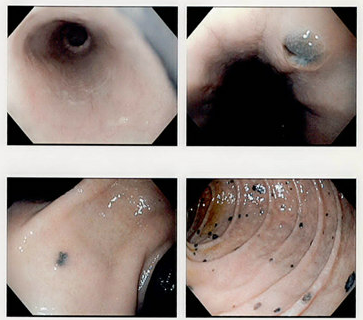Monday Poster Session
Category: Stomach and Spleen
P4223 - Malignant Melanoma of the Gastrointestinal Tract: A Case Report
Monday, October 27, 2025
10:30 AM - 4:00 PM PDT
Location: Exhibit Hall

Kenechukwu Edoga, MD (he/him/his)
Arkansas College of Osteopathic Medicine
Fort Smith, AR
Presenting Author(s)
Kenechukwu Edoga, MD1, Abiodun Abioye, MD1, Dustin Lehnert, DO1, Tony Demondesert, MD2
1Arkansas College of Osteopathic Medicine, Fort Smith, AR; 2Mercy Hospital, Fort Smith, AR
Introduction: Malignant melanoma (MM) is an aggressive tumor originating from melanocytes and represents the deadliest form of skin cancer globally. Risk factors include UV exposure, prior melanoma, and family history. While MM often metastasizes to local lymph nodes before affecting distant sites like the lungs and brain, it is also among the most common malignancies to metastasize to the gastrointestinal (GI) tract. GI metastases can be asymptomatic but may present with abdominal pain, weight loss, nausea, obstruction, gastrointestinal bleeding, or chronic anemia.
Case Description/
Methods: A 31-year-old man with chronic alcohol use was admitted with a two-week history of abdominal pain, nausea, and loss of appetite. On examination, he exhibited tachycardia, hypotension, jaundice, scleral icterus, epigastric and RUQ tenderness, along with a notable left auricular mass. Lab results indicated hyponatremia, anemia, thrombocytopenia, transaminitis, and hyperbilirubinemia. CT imaging revealed numerous hepatic nodules, peripancreatic lymphadenopathy, and ascites, raising suspicion for metastatic disease.
Oncology recommended biopsy of the auricular mass. During hospitalization, the patient's anemia worsened, necessitating multiple transfusions. Gastroenterology consultation led to an esophagogastroduodenoscopy (EGD), which revealed scattered pigmented nodules throughout the stomach. Biopsy confirmed metastatic malignant melanoma. Unfortunately, the patient and his family opted for hospice care, and he passed away shortly after the transition.
Discussion: GI melanoma can be primary or metastatic, with primary tumors most frequently arising in the anorectal region (53%) and less commonly in the stomach (3%) or small intestine (2%). In this case, the cutaneous lesion likely served as the primary site. Diagnosis of GI metastasis is challenging due to non-specific symptoms and varied imaging presentations, especially in patients with comorbidities. Early detection through endoscopy or capsule endoscopy is crucial when GI symptoms arise in melanoma patients.
The prognosis for metastatic GI melanoma is poor, with a 10% five-year survival rate for stage IV disease compared to 97% for stage 0. This underscores the importance of early detection and intervention. Surgical resection and modern systemic therapies can offer symptom relief and potentially improve survival in select patients with limited metastatic sites.

Figure: Image showing melanotic lesions involving the gastric mucosa
Disclosures:
Kenechukwu Edoga indicated no relevant financial relationships.
Abiodun Abioye indicated no relevant financial relationships.
Dustin Lehnert indicated no relevant financial relationships.
Tony Demondesert indicated no relevant financial relationships.
Kenechukwu Edoga, MD1, Abiodun Abioye, MD1, Dustin Lehnert, DO1, Tony Demondesert, MD2. P4223 - Malignant Melanoma of the Gastrointestinal Tract: A Case Report, ACG 2025 Annual Scientific Meeting Abstracts. Phoenix, AZ: American College of Gastroenterology.
1Arkansas College of Osteopathic Medicine, Fort Smith, AR; 2Mercy Hospital, Fort Smith, AR
Introduction: Malignant melanoma (MM) is an aggressive tumor originating from melanocytes and represents the deadliest form of skin cancer globally. Risk factors include UV exposure, prior melanoma, and family history. While MM often metastasizes to local lymph nodes before affecting distant sites like the lungs and brain, it is also among the most common malignancies to metastasize to the gastrointestinal (GI) tract. GI metastases can be asymptomatic but may present with abdominal pain, weight loss, nausea, obstruction, gastrointestinal bleeding, or chronic anemia.
Case Description/
Methods: A 31-year-old man with chronic alcohol use was admitted with a two-week history of abdominal pain, nausea, and loss of appetite. On examination, he exhibited tachycardia, hypotension, jaundice, scleral icterus, epigastric and RUQ tenderness, along with a notable left auricular mass. Lab results indicated hyponatremia, anemia, thrombocytopenia, transaminitis, and hyperbilirubinemia. CT imaging revealed numerous hepatic nodules, peripancreatic lymphadenopathy, and ascites, raising suspicion for metastatic disease.
Oncology recommended biopsy of the auricular mass. During hospitalization, the patient's anemia worsened, necessitating multiple transfusions. Gastroenterology consultation led to an esophagogastroduodenoscopy (EGD), which revealed scattered pigmented nodules throughout the stomach. Biopsy confirmed metastatic malignant melanoma. Unfortunately, the patient and his family opted for hospice care, and he passed away shortly after the transition.
Discussion: GI melanoma can be primary or metastatic, with primary tumors most frequently arising in the anorectal region (53%) and less commonly in the stomach (3%) or small intestine (2%). In this case, the cutaneous lesion likely served as the primary site. Diagnosis of GI metastasis is challenging due to non-specific symptoms and varied imaging presentations, especially in patients with comorbidities. Early detection through endoscopy or capsule endoscopy is crucial when GI symptoms arise in melanoma patients.
The prognosis for metastatic GI melanoma is poor, with a 10% five-year survival rate for stage IV disease compared to 97% for stage 0. This underscores the importance of early detection and intervention. Surgical resection and modern systemic therapies can offer symptom relief and potentially improve survival in select patients with limited metastatic sites.

Figure: Image showing melanotic lesions involving the gastric mucosa
Disclosures:
Kenechukwu Edoga indicated no relevant financial relationships.
Abiodun Abioye indicated no relevant financial relationships.
Dustin Lehnert indicated no relevant financial relationships.
Tony Demondesert indicated no relevant financial relationships.
Kenechukwu Edoga, MD1, Abiodun Abioye, MD1, Dustin Lehnert, DO1, Tony Demondesert, MD2. P4223 - Malignant Melanoma of the Gastrointestinal Tract: A Case Report, ACG 2025 Annual Scientific Meeting Abstracts. Phoenix, AZ: American College of Gastroenterology.
